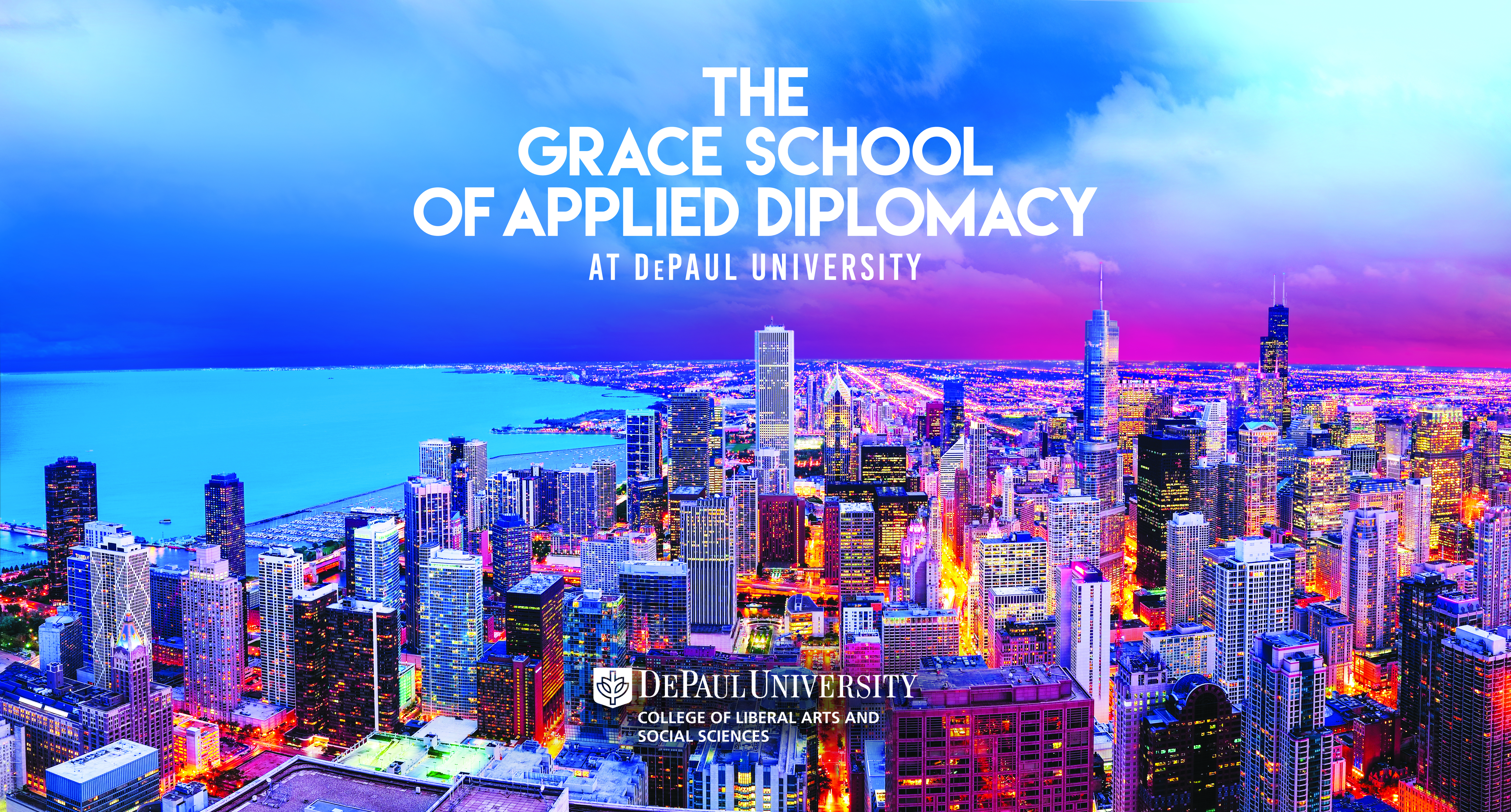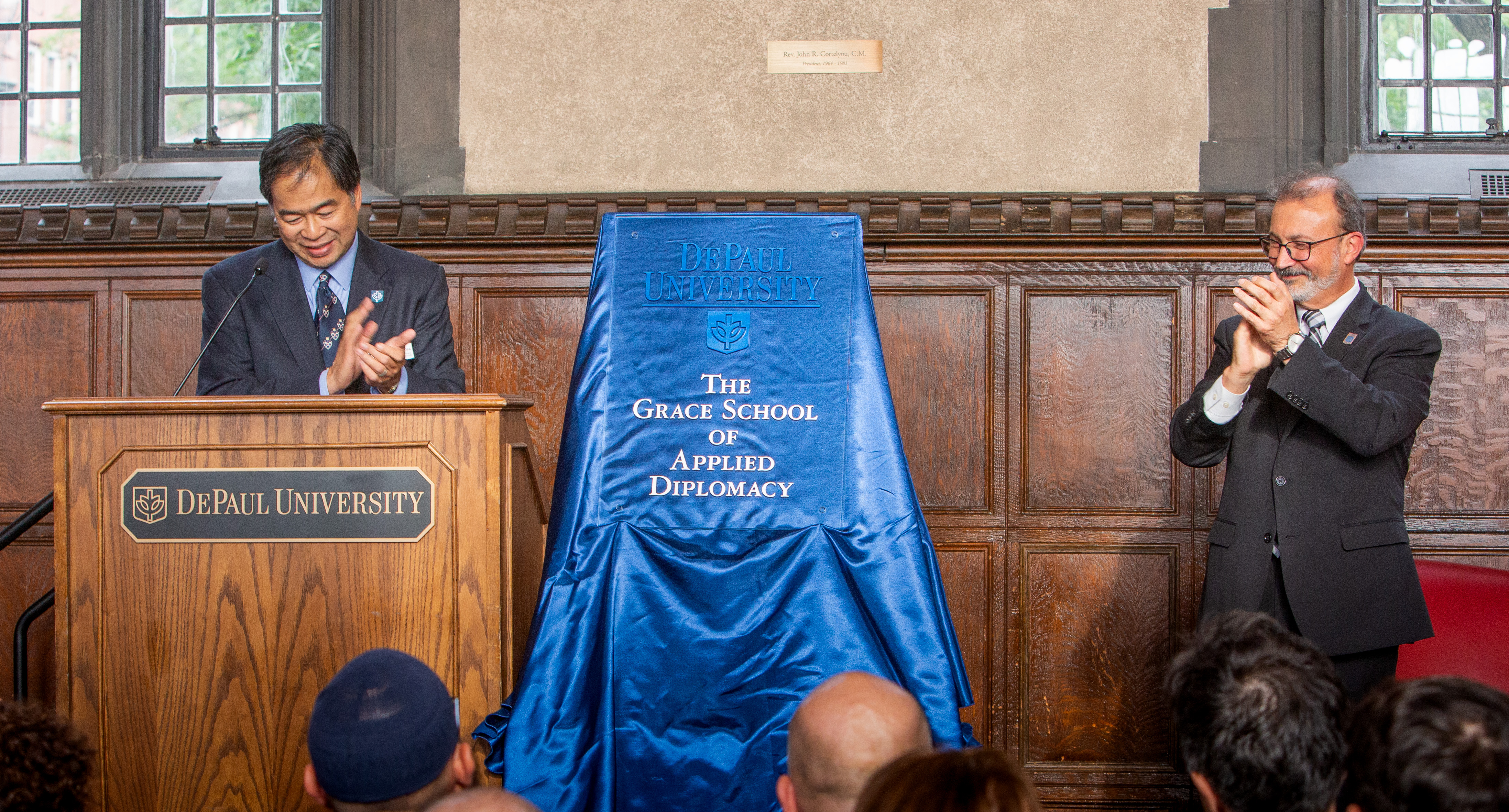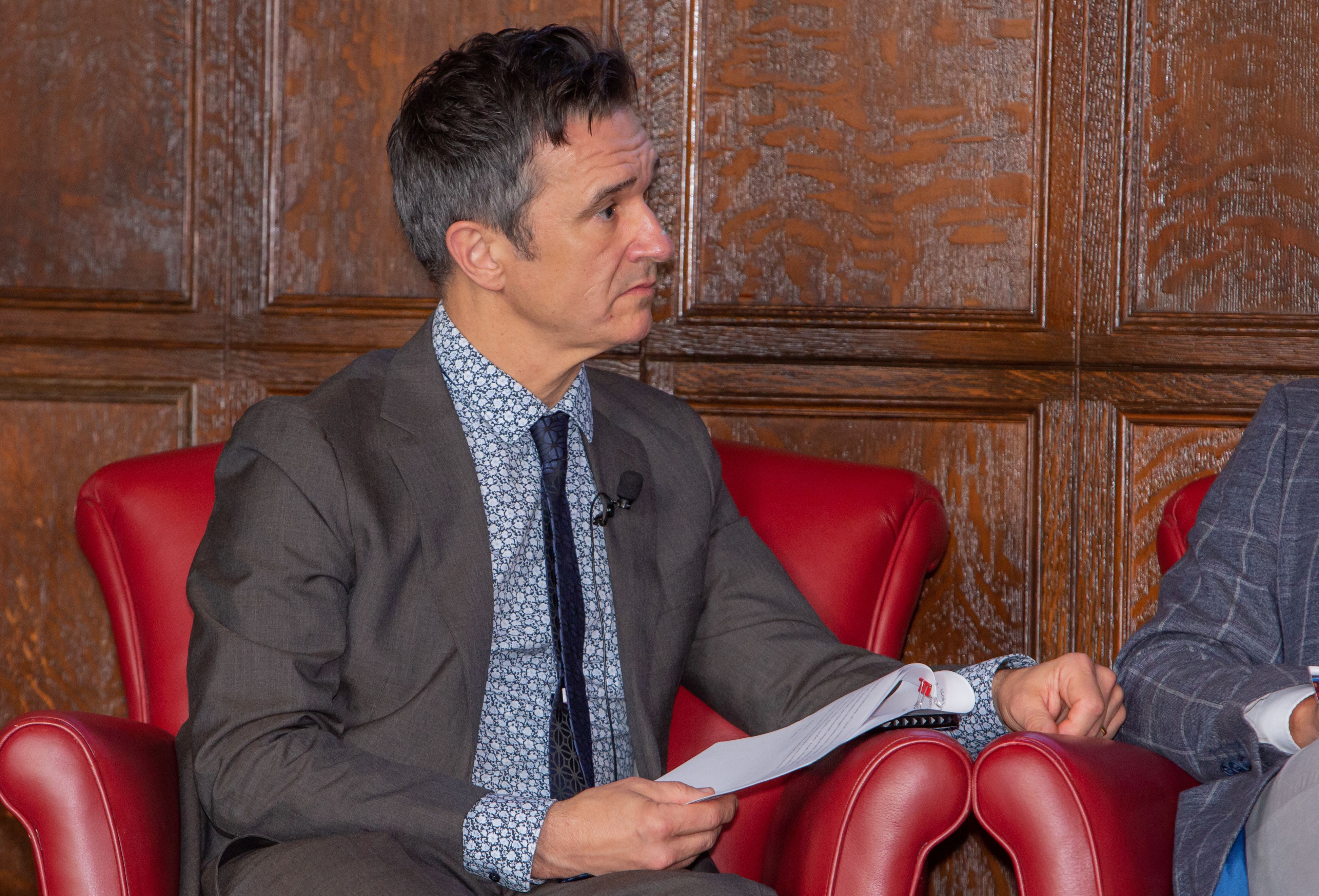 A $20 million gift from anonymous benefactors has established The Grace School of Applied Diplomacy at DePaul University. (DePaul University/Francis Paola Lea)CHICAGO — DePaul University has received a $20 million gift from anonymous benefactors to establish The Grace School of Applied Diplomacy, which is designed to transform the landscape of diplomacy by empowering a diverse generation of diplomats from a wide range of professions with the education and skills needed to develop solutions to society’s most vexing challenges.
A $20 million gift from anonymous benefactors has established The Grace School of Applied Diplomacy at DePaul University. (DePaul University/Francis Paola Lea)CHICAGO — DePaul University has received a $20 million gift from anonymous benefactors to establish The Grace School of Applied Diplomacy, which is designed to transform the landscape of diplomacy by empowering a diverse generation of diplomats from a wide range of professions with the education and skills needed to develop solutions to society’s most vexing challenges.
The Grace School, housed in DePaul’s College of Liberal Arts and Social Sciences, will open this fall. The gift will endow the school and provide support for faculty and students.
DePaul was founded in Chicago in 1898 by the Congregation of the Mission (Vincentians), a Roman Catholic religious community dedicated to following the ideals of St. Vincent de Paul, the 17th century priest for whom the university is named.
“At DePaul we ask the Vincentian question ‘What must be done?’ and The Grace School will meet that challenge head on by preparing students for a wide variety of professions that require knowledge and skills in mediation, conflict resolution and bridge building,” said A. Gabriel Esteban, Ph.D., president of DePaul. “The school touches at the heart of DePaul’s mission and its Catholic, Vincentian and urban identity by developing a curriculum that will empower diverse graduates to collaborate in pursuit of sustainable social justice at home and abroad.
“We are grateful for the generosity of the donors and this remarkable gift, which will support students striving to make our world a better place,” Esteban added.
Transcending the traditional approach
“Unlike traditional diplomacy programs that primarily concentrate on preparing students for a career in the foreign service, the interdisciplinary curriculum of The Grace School is designed to not only prepare students for work in the diplomatic corps, but also for applying the tools of diplomacy to careers in the private sector, the sciences, community service, the arts, religious leadership, and in the work of community organizing and activism,” said Guillermo Vásquez de Velasco, dean of the College of Liberal Arts and Social Sciences.
“Diplomacy is no longer the sole purview of government officials and mediators,” he said. “The world needs transprofessional diplomats at every level to build bridges across differences that promote isolation, segregation, extremism, radicalization, and other challenges to collective prosperity.
“The goal of The Grace School is to prepare the next generation of leaders to create human-centered solutions to problems as diverse and complex as urban poverty, sectarian violence and human migration. At the heart of this work is the ability to foster dialogue, reach common understanding and devise mutually beneficial outcomes across different sectors,” noted Vásquez de Velasco.
 The Grace School of Applied Diplomacy was officially announced by DePaul President A. Gabriel Esteban, Ph.D., and Guillermo Vásquez de Velasco, dean of the College of Liberal Arts and Social Sciences at a ceremony Sept. 10, 2019 at Cortelyou Commons. (DePaul University/Randall Spriggs)
The Grace School of Applied Diplomacy was officially announced by DePaul President A. Gabriel Esteban, Ph.D., and Guillermo Vásquez de Velasco, dean of the College of Liberal Arts and Social Sciences at a ceremony Sept. 10, 2019 at Cortelyou Commons. (DePaul University/Randall Spriggs)DePaul’s Chicago advantage
DePaul is in a position to answer this challenge, in part because of its deep relationship with the richly multi-ethnic and multilingual city of Chicago, where 36% of residents speak a language other than English. Additionally, the city is home to the Chicago Consular Corps, comprised of Consulates, Consulates General and Honorary Consulates that represent more than 80 countries.
“Chicago’s great diversity is an incredible resource and inspiration for our work,” said Vásquez de Velasco. “We know that modern challenges require approaches that span viewpoints, religious faiths, ethnic identities, disciplines and geographic boundaries. The school will link the best of the social sciences and humanities with real-world practice to amplify the efficacy of our diverse campus community. We will create new frameworks, tools and partnerships so that our students have the values, knowledge and skills to build a better world.”
Grace-filled acts
“The name of the school — Grace — reflects what this program is designed to convey, which is to inspire students to enter into a deep level of collaboration with a diverse array of individuals and communities in order to go against the grain regarding the way in which many human interactions are conducted, and to build bridges as a bulwark against fear, hatred, distrust and cynicism,” explained David Wellman, inaugural director of the school and author of “Sustainable Diplomacy: Ecology, Religion and Ethics in Muslim-Christian Relations.”
“The name Grace also reflects the fact that our school’s mission and curriculum emerge from an extraordinary and diverse group of people coming together to create something that no one group could have accomplished on their own,” he added.
Modern diplomacy
Academic offerings in The Grace School come from more than 20 different fields of study across the College of Liberal Arts and Social Sciences, such as art, anthropology, international public service, geography, history, international studies and political science. Classes might include “U.S.-Africa Relations,” “Topics in Nonviolence,” “Diplomacy: Its Past, Present and Future,” and “Social Justice and Social Change.”
Undergraduate students can earn a bachelor’s degree in applied diplomacy while focusing on one of 10 concentrations. These include diplomacy and international relations; urban diplomacy; diplomacy and international political economy; diplomacy and the arts; diplomacy, culture, and identity; diplomacy, NGOs and peacebuilding; diplomacy and religion; diplomacy and international law; history of diplomacy; and diplomacy and critical theory.
Graduate students can earn a master’s degree in applied diplomacy while focusing on one of six concentrations. These include diplomacy and international public service, diplomacy and global public health, urban diplomacy, diplomacy and migration, diplomacy and critical ethnic studies, and critical approaches to diplomacy.
“A diplomat is someone who is not just advocating for their own side, but rather someone who is able to put their feet into the shoes of other people and see that the well-being of those they represent is intrinsically connected to the well-being of others. In that respect, I see the work of diplomacy as a higher calling, a calling that The Grace School is ready to undertake,” said Wellman, an associate professor of religious studies at DePaul, where he researches the relationship between diplomacy, interreligious engagement and ecological ethics in building bridges across boundaries of difference.
The gift will also have an impact in the following ways:
- Increase experiential learning opportunities, such as study abroad for students who might not otherwise be able to afford such programs.
- Transform the demographic profile of college graduates who apply for jobs in diplomacy.
- Connect faculty and students with professional and citizen diplomats.
 David Wellman, an associate professor of religious studies at DePaul, will serve as The Grace School's inaugural director. Wellman researches the relationship between diplomacy, interreligious engagement and ecological ethics in building bridges across boundaries of difference and is the author of “Sustainable Diplomacy: Ecology, Religion and Ethics in Muslim-Christian Relations.” (DePaul University/Randall Spriggs)"Students repeatedly identify cost as the No. 1 barrier to study abroad participation on all interest surveys," said Wellman. "We will dramatically expand scholarship opportunities both for applied diplomacy students who wish to gain global experience through study abroad trips or internships, and those who choose to pursue U.S. regional study away opportunities appropriate to their course of study.
David Wellman, an associate professor of religious studies at DePaul, will serve as The Grace School's inaugural director. Wellman researches the relationship between diplomacy, interreligious engagement and ecological ethics in building bridges across boundaries of difference and is the author of “Sustainable Diplomacy: Ecology, Religion and Ethics in Muslim-Christian Relations.” (DePaul University/Randall Spriggs)"Students repeatedly identify cost as the No. 1 barrier to study abroad participation on all interest surveys," said Wellman. "We will dramatically expand scholarship opportunities both for applied diplomacy students who wish to gain global experience through study abroad trips or internships, and those who choose to pursue U.S. regional study away opportunities appropriate to their course of study.
“Our interdisciplinary and transprofessional approach will redefine the possibility of diplomacy for generations of students who might otherwise not have chosen the field. Paired with our commitment to expanding access to financial support for experiential learning opportunities, we hope to fundamentally alter the way that diplomacy is understood and practiced by fostering greater inclusivity and diversity among graduates entering the field,” Wellman said.
A portion of the gift creates The Grace School International Student Fund that will bolster international student recruitment and expand access to a liberal arts education to students from underrepresented countries. The funding also creates an endowed chair in transprofessional diplomacy, endowed professorships for a disciplinarily diverse group of faculty to place their fields of study into dialogue with the practice of diplomacy, and a program supporting practitioners in residence.
Mission driven
Vásquez de Velasco sees The Grace School as an example of DePaul’s mission put into action and an opportunity to transform the very notion of who is a diplomat.
“Twenty-first century challenges require collaborative approaches to sustainably address root causes,” he said. “Devising such solutions necessitates bringing people together to envision a more just, peaceful and prosperous existence. Applied diplomacy is at the heart of the work that must be done, and The Grace School of Applied Diplomacy can fundamentally transform the field and the practice.”
###
Media Contact:
Russell Dorn
312-362-7128